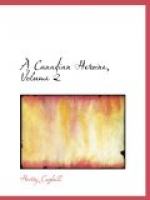But, of course, it did at last become known that Mrs. Costello was going away. She and Lucia both spoke of it lightly, as an ordinary occurrence enough; but it was so unlike their usual habits, that each person who heard the news instantly set himself or herself to guess a reason, and, connecting it with the loss of Lucia’s gay spirits, most persons came naturally to one conclusion.
It did not matter whether they said, “Poor Lucia!” with the half-contemptuous pity people give to what they call “a disappointment,” or “What else could she expect?” “I told you so!” or any other of the speeches in which we express our delight in a neighbour’s misfortunes—every way of alluding to the subject was equally irritating to Mrs. Bellairs, who heard of it constantly, and tried in vain to stop the tongues of her acquaintance. She could not do it; and what she feared most, soon happened. Lucia came, in some way, to be aware of what was going on, and this last pain, though so much lighter than those she had already borne, seemed to break down all her pride at once. In her own room that night she sat, hour after hour, in forlorn wretchedness—her own familiar friends, the companions of her whole life, were making her misery the subject of their careless gossip. They knew nothing of the real wound which she had suffered, but they were quite ready to inflict another; and the feeling of loneliness and desertion which filled her heart at the thought was more bitter than all that had gone before. She remembered Maurice, and wondered drearily whether he too would have misjudged her; but for the moment even her faith in him was shaken, and she turned from her thoughts of him without comfort.
But this mood was too unnatural to last long. Before morning her courage had returned, and her strong impulse and desire was to show how little she felt the very sting which was really torturing her. She stood long before her glass that morning. The face which had grown hateful to herself was still beautiful to others. She studied it in every line. She wanted to see what there could be in it to give people the idea of love-sickness. She wanted to force back into it the old light and gaiety. Impossible! With a shudder she covered it with her hands. Never again could she be a child. She had passed through the storm, and must bear its traces henceforward. But, at least, it had been the thunderbolt of heaven, and not the hand of man, which had wounded her. Her very sorrow was sacred. She lifted up her head again, and saw that there was a calm upon her face, which was better than pride. Instinctively she knew that none but idiots could look at her with contempt, or the pity which is so near it; and she went out into her little world again, sad at heart, but steadfast and at peace. So the days passed on, and grew into weeks, and the time for their leaving Cacouna came very near. It had been delayed more than a week beyond the month on which Mrs. Costello had first counted for security; but on the very eve of their departure she had overcome her anxiety, and was secretly glad to make the most of every little excuse for lingering yet another and another day at the cottage.




